I’ve been on vacation since a week ago Friday, but didn’t plan to take a blog vacation. My plans were to spend every morning in the garden but the weather had other ideas. We’ve been alternately hot and humid and cool and humid with the ups and downs punctuated by a lot of rain. I mean a lot. In a week’s time we’ve received close to what we generally get in a month. And it’s not like outside of this past week there hasn’t been any rain! It’s times like this when I am glad my garden soil is on the sandy side.
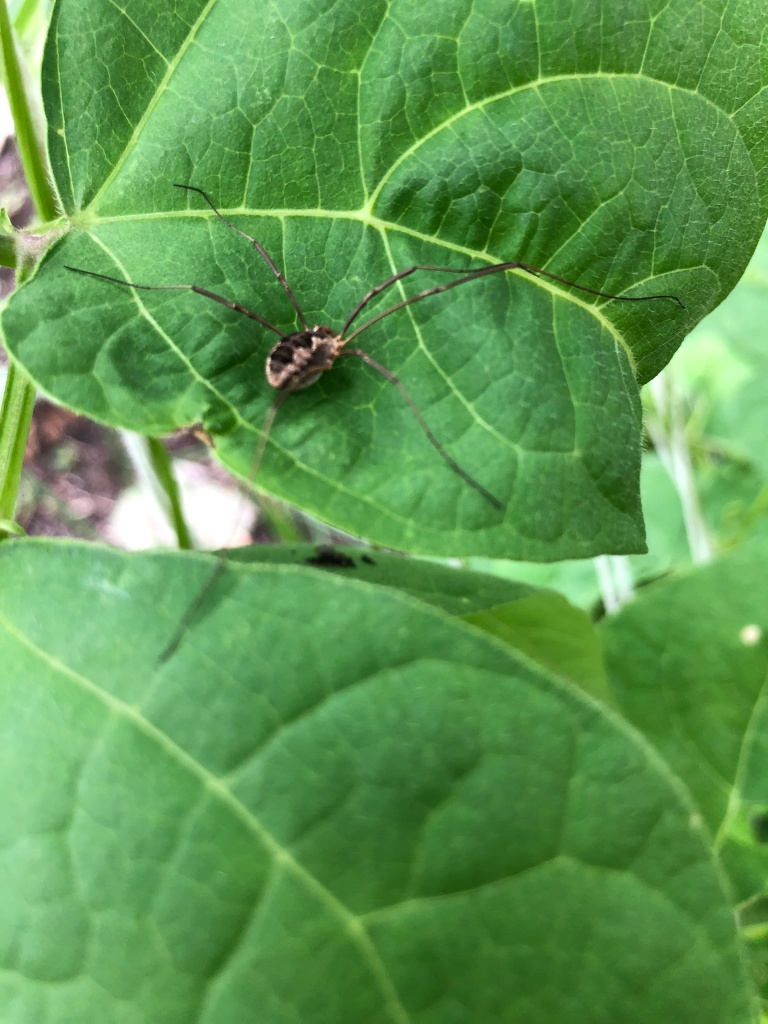
I’ve spent quite a bit of time indoors and didn’t get to spend much time in the garden until Wednesday. I made up for all the mornings the weather kept me out! The day was partly cloudy and the temperature topped out at 73F/23C. Aside from the giant mosquitoes, it was perfect. And I took advantage. I’m an early riser and was out in the garden almost immediately following breakfast and I didn’t come in again until lunch, about 5 hours. I took an hour for lunch and went back outside for another two—or was it three? Don’t remember—hours before I was too tired to keep going.
I was fully expecting Thursday morning to be rainy again and when it wasn’t I put my gardening gear on and spent another three hours before I was out of gas. But the garden looks great and feels great. The vegetable plants were getting crowded out by the edible weeds and arugula/rocket and after I was finished, everyone had room to breathe again. I was also able to assess how everyone is doing and the answer is great, mostly.
None of the melons I planted survived the squirrels. But all those butternut seeds I shoved in the soil after the squirrels ate the plants? They are doing amazing and about to begin vining, so in an attempt to repurpose old bicycle tubes that have been patched too many times to keep using, I cut a couple into strips to make “twine” and tied them to the ladder for the butternuts to climb. I hope this works because I have a big stash of old tubes I didn’t know what to do with and it would be convenient to have reusable twine instead of needing to fork over cash for a big ball every year. I’ll let you know how it goes.
None of the okra came up, but that’s ok. That was a free seed giveaway that I didn’t have much invested in because okra isn’t a vegetable we generally have at my house. We’ve had it before and it was ok. Mostly though I just think the flowers are really pretty.
As of Wednesday none of the two-year-old zucchini and crookneck squash seeds I had planted and protected with row cover fabric in a last ditch effort to have more than one zucchini plant had come up. So I removed the fabric and thought I’d just let the arugula fill in the big empty space. But then on Thursday I saw two squashes poking up! And on Friday there was a third! And Saturday morning there were none because I didn’t think I needed to protect the plants and a squirrel dug up all three of them and ate them.
Saturday morning over breakfast James and I had a discussion about hate and love from a comment Umberto Eco made in the documentary about his library we watched Friday night. He said love is narrow and specific but hate is big and general and something everyone can easily take part in. We agreed that hate is easier than love, but love doesn’t have to be specific, it can be just as big as hate, only it’s really hard to do. I recalled that when I was a kid and my sister and I were arguing and yelling, “I hate you!” at each other, my mom scolded us, not for arguing, but for saying “hate.” Hate, she insisted, is a word with force and malice and not to be used lightly. In her opinion, if you hate something you are saying you could kill that person or thing. Whether or not you agree, we do use the word imprecisely, as though it means only to dislike something—I hate being late; I hate it when drivers cut me off; I hate Brussels sprouts, etc. For that matter we use “love” imprecisely too, as though it merely means to like or enjoy something—I love that color on you; I love pizza; I would really love it if you’d clean up after yourself.
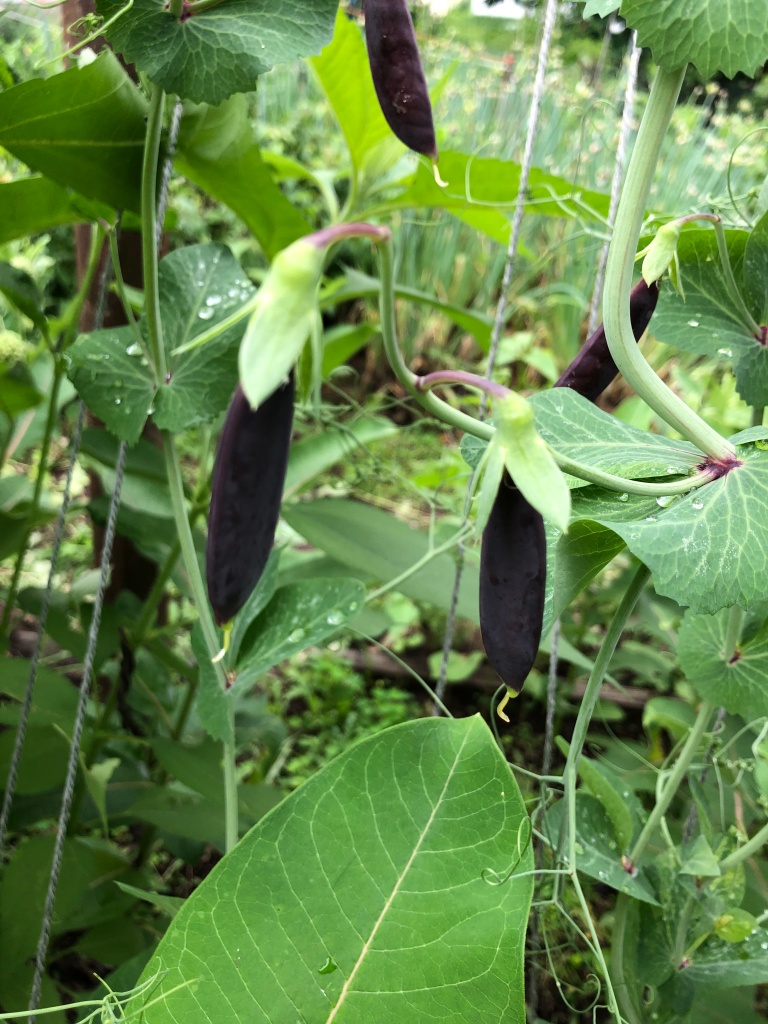
So, after I discovered the newly sprouted squash had been once again devastated by a squirrel, I thought, I really hate squirrels. And then I stepped back. No, I don’t hate them. They are certainly a nuisance—the one who keeps climbing our screen door is beginning to make tiny little holes in the screen—and they are destructive, but they are only being themselves taking advantage of opportunities or curiosity or having fun. As much as I’d like to impute them with deliberate maliciousness, I am fairly certain this is something they lack. The squirrels are only being squirrels and knowing their habits, it was on me to protect the emerging squash and I did not. I don’t hate the squirrels, I am disappointed and frustrated with myself for not thinking.
Saturday afternoon we went over to a neighborhood nursery that has their veg and herbs at 50% off. I hoped to find some zucchini or muskmelon, but everything had been picked over and the only veg left was some sad kale and really hot peppers. As for the herbs, there was a wide variety of mints to choose from if I had wanted mint. There was some marjoram that was big and sprawling and healthy looking, so I brought one home along with a seed packet of watermelon radish to sow in August for a fall harvest.
None of the summer savory I sowed with the pole and lima beans came up, maybe because the squirrels replanted the seeds too deeply when they were helping themselves to the lima beans, and I decided to plant this lovely smelling herb in a big empty space among the limas. After I planted the marjoram I looked at the tag and noticed it said the herb is perennial. Then I recalled I had tried growing marjoram in the herb spiral years ago and the plant did not survive the winter, leading me to believe that while it may be perennial, it is not perennial in my garden. Now I have a suspicion that the herb is going to love where I planted them in a vegetable bed to fill a space and I am going to either need to transplant them next year or let them alone where they are happy. I suppose there are worse things in the garden than a happy perennial herb in a place I’d rather they weren’t. But next spring is a long time away and there’s no telling at this point whether Marjoram will be happy where I planted them. I will save seeds though so I can grow some of my own next year, just in case.
Since the nursery didn’t have any zucchini I decided, based on an email from Seed Savers Exchange about seeds that can still be direct sown in June, to try one more time with the zucchini. I shoved in about five Black Beauty Zucchini seeds and and five crookneck squash seeds. The strawberries that I managed to protect from the squirrels by surrounding them with big wire baskets, are done with their berries and since the plants are now well established, they will, in theory, not be bothered by squirrels. I removed the baskets and set them over the squash seeds where they will remain until whatever sprouts is well and truly up and big enough to not be bothered.
But wouldn’t you know it, when I was out in the garden this morning checking on the protector baskets, two squash sprouts had come up from last week’s desperate planting. They are outside the baskets and I have nothing to put over them, but they are also sort of hiding among the little arugulas and purslane that I didn’t weed out of the bed. Perhaps they will go unnoticed by the squirrels? No matter. If they all fail, I do have one zucchini plant from the very first sowing that is growing and looking great. Whether I have a modest harvest from one plant or a bumper crop from many time will tell.
I was weeding outside the chicken garden fence line in the alley this morning and discovered a small tomato plant growing in a pile of composting leaves. I lifted them out and moved them to a bed in the garden. This being a volunteer alley tomato any resulting fruit will be a complete surprise. I am excited to see what happens.
I’ve picked enough snap peas to add to a stir fry for tonight’s dinner. Looking forward to that! The garden peas are going gangbusters and covered in flowers and slowly fattening pods. I get so excited to eat peas that I tend to pick them before they reach peak fatness, I am trying to be patient, but I hope by the end of the week there is enough to pick and add to a salad.
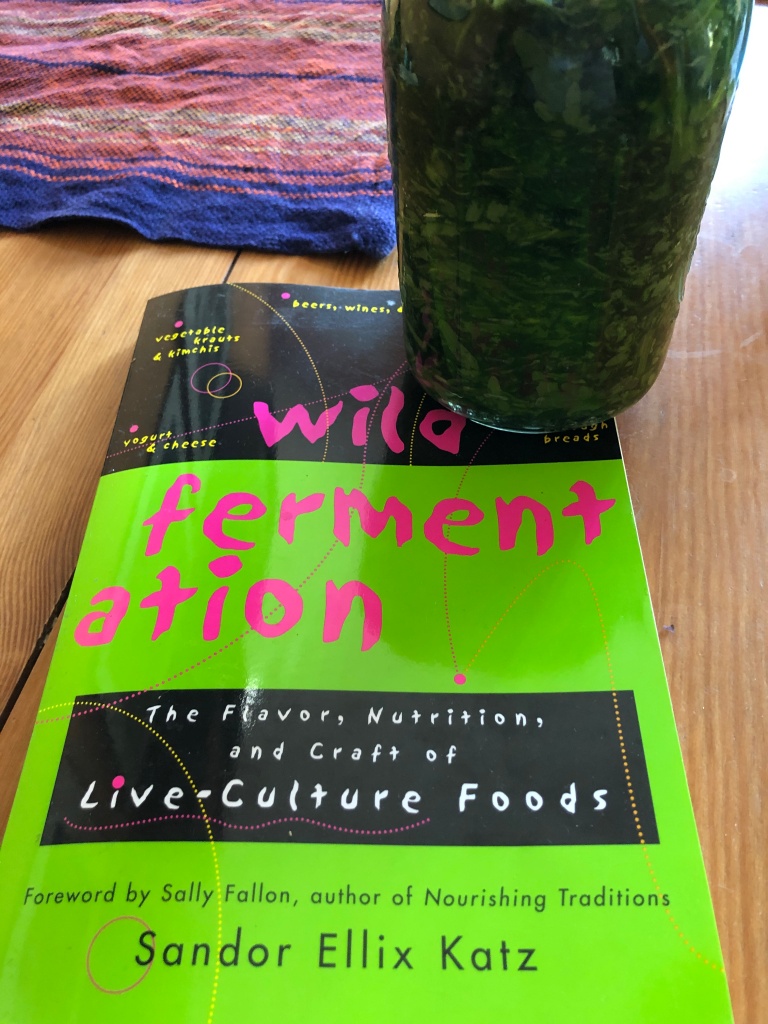
Since the garden is abundant in arugula (rocket), James has made several jars of pesto and put them in the freezer for later. Saturday I was looking for a fermented onion recipe because the walking onions are about to set their top bulbs and I want to be sure to use them this year for more than the occasional addition to a meal. In the process of looking for a recipe I found one for gundru. Gundru is fermented leafy green vegetables that originates from Nepali cuisine. I followed Sandor Katz’s recipe in Wild Fermentation.
Basically, you need brassica leaves. I had a few radish leaves and the rest is arugula. I wanted to add horseradish leaves but the horseradish is currently surrounded by stinging nettle and I would not have been able to protect myself enough to wade in there and get some leaves. To make gundru, wilt the leaves in the sun for a few hours and then crush them up on a cutting board with a rolling pin, then stuff them, I mean really stuff them, into a jar until you can stuff no more, which, it turns out, is a lot. Put the lid on, set in a warm place for 2-3 weeks. The crushed greens essentially ferment in their own watery juices to make a pungent pickle. I’ll be sure to let you know how they turn out.
Katz’s book surprisingly does not have an onion recipe, but Duck Duck Go found me one that we’ll be using perhaps as soon as next weekend. The basil in the garden is not big enough to pick yet, but I’ve got thyme and fennel (and marjoram!) and mint as potential herbal adds. Maybe not mint. Unless, do mint and onions go together? I don’t recall ever having the two together and perhaps there is a reason for that?
In chicken news, Ethel is no longer broody! She is back to her old self as though nothing had changed. Poor Sia, however, with all this rain, her beautiful white bouffant is dirty and bedraggled and she runs around with wet feathers dangling in her face. She absolutely doesn’t care and is as goofy as usual.
The elderberry in the chicken garden has, once again, grown enormous. Every spring I prune and prune and each year I prune more than the previous year and worry that maybe this time I did too much. Looking at Elderberry now I can’t even tell that they were pruned; they reach higher and wider than ever. And now they are covered in flowers and I am anticipating jam when I haven’t even finished the jam made from last year’s bumper crop of berries.
Clearly, Elderberry is extremely happy. With all the rain and the chickens spending their days in the deep shade beneath, Elderberry is feeling loved and well-fed. Between expansive Elderberry and the ever suckering prairie rose, there is not much open space in the chicken garden. It’s feeling a bit wild out there, but the exuberance of it all is something I am not willing to try and tame, at least for now.
Some garden photos for your viewing pleasure:
Reading
- Article: The Humble Carrot’s Colorful History. I learned that carrots are originally from the Arabs. First mentioned by a Baghdad author in a cookbook in the 10th century. Arabs grew them in Spain in the 12th century, but not until about 200 years after that did they make it to northern Europe where they were often used to make jams, sweet condiments, and puddings. Fascinating! The article was adapted from a book called The Seed Detective by Adam Alexander, and I immediately requested it from the library.
- Book: Smoke and Ashes by Amitav Ghosh. This book is the result of all the research into the India-China opium trade Ghosh did for his Ibis Trilogy. It’s a superb history that Ghosh tells in a more causal style than his other nonfiction books. He includes bits about writing his Ibis novels too. Basically, Britain was the world’s first international drug cartel. It is astonishing how many wealthy families in Britain and even the United States have connections to the opium trade including Forbes and Franklin Delano Roosevelt’s grandfather. Ghosh also makes connections to the Sacklers and the current opioid epidemic in the United States.
- Article: The free trade myth. Just like the British and Dutch used to claim forcing opium on China was in the name of free trade, the US has for decades touted a free trade agenda. But it has never actually been free. What it really means is that the US is free to manipulate markets and force other countries to accept our trade “agreements” and rules.
- Article: US spent $98,000 per minute on nuclear weapons in 2023, new report shows. Every minute! It’s absurd. And politicians say that social security and medicare costs too much and struggling families don’t deserve help buying food because the government doesn’t have any money. Pfft! The US is in the process of modernizing its nuclear arsenal because already having the ability to blow up the planet several times over apparently isn’t enough. When we blow up Earth, we’re taking the moon with us! And the terrifying thing is, all the other nuclear armed countries are also spending more to upgrade their weapons. Global spending on nuclear weapons increased more than 13% in 2023. The world has been supremely lucky up until now, but how much longer will that luck last? How long until someone decides a nuclear winter is the fix we need for climate change?
- Essay: The Age of Flowers by Mark Watson. A lovely essay about hanging out with plants that includes a meditation for visiting plants and learning from them.
Quote
“The term ‘hipster,’ in fact derives from the Chinese opium smoker of the 1800s, who’d spent much of his time smoking while reclining on one hip. The hipster counterculture took inspiration from heroin-addicted jazz greats like Charlie Parker and John Coltrane.”
~Amitav Ghosh, Smoke and Ashes
Listening
- Emergence Magazine: Earth as Koan, Earth as Self, an Interview with Susan Murphy Roshi. This was a marvelous conversation and I immediately placed a request at the library for Murphy’s book, A Fire Runs Through All Things.
- Podcast: The Way Out is In: Happy Farmers Change the World. This is a podcast of Plum Village, the Buddhist monastery in France founded by Thich Nhat Hahn. The conversation focuses on land regeneration, happy farming, mindfulness, connecting with nature, and climate change.
Watching
- Documentary: Umberto Eco: Library of the World. Umberto Eco’s private library—holy shirt! An enjoyable documentary in Italian with subtitles. It is hard to find, but we were able to rent it through Fandango, though if you have Amazon Prime, it appears you can also view it there.
James’s Kitchen Wizardry
We’ve enjoyed what we like to call weed salad a number of times now. The “weeds”: arugula/rocket, amaranth, lambs quarters, wood sorrel, curly dock, creeping Charlie/ground ivy. Toss in some garlic or onion chives, a little mint perhaps, a bit of fennel then add other veg—a few small radishes from the garden, and not from the garden, beans, a grain, carrots. Top with a homemade dressing. Nutritious and delicious!
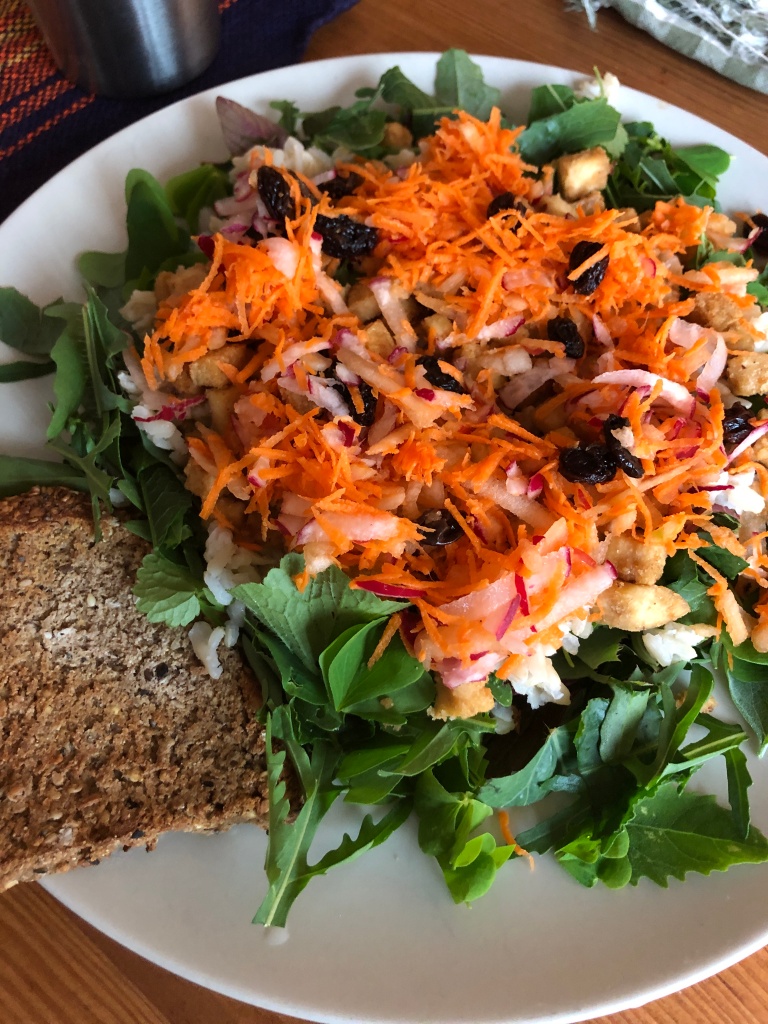

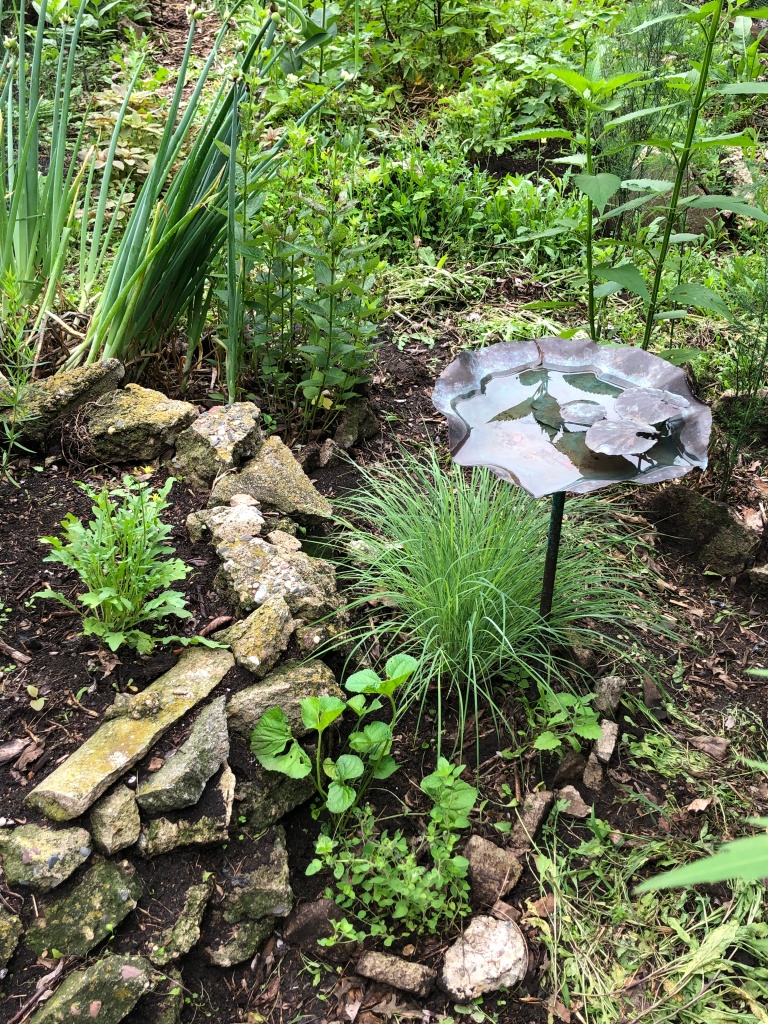
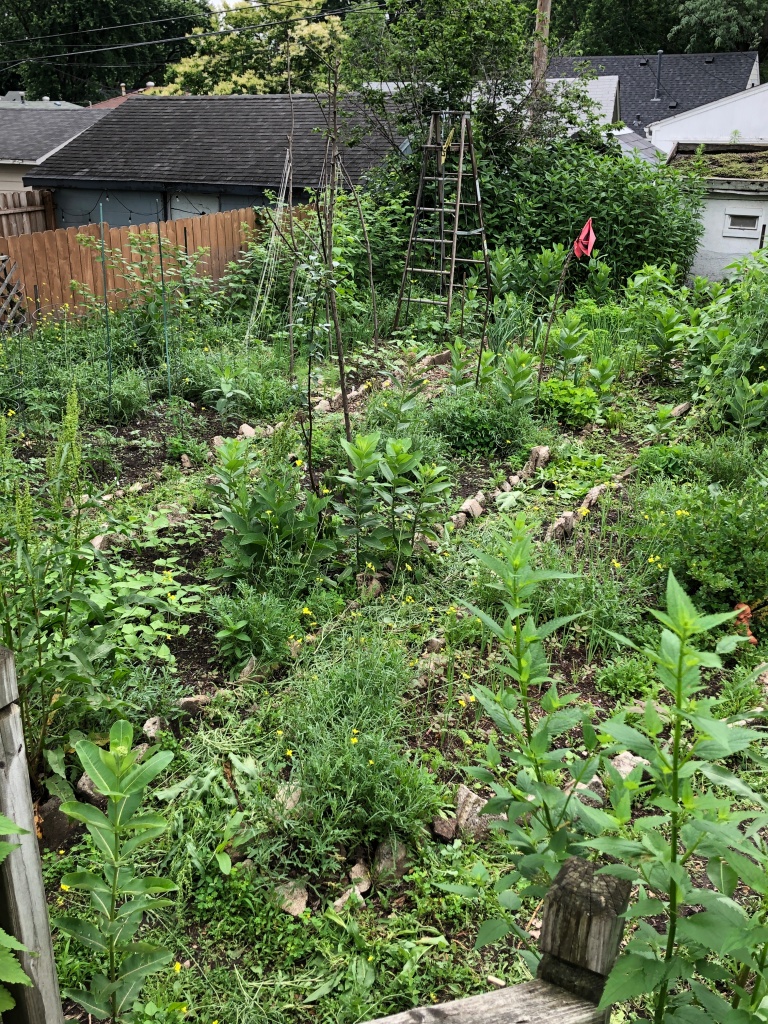
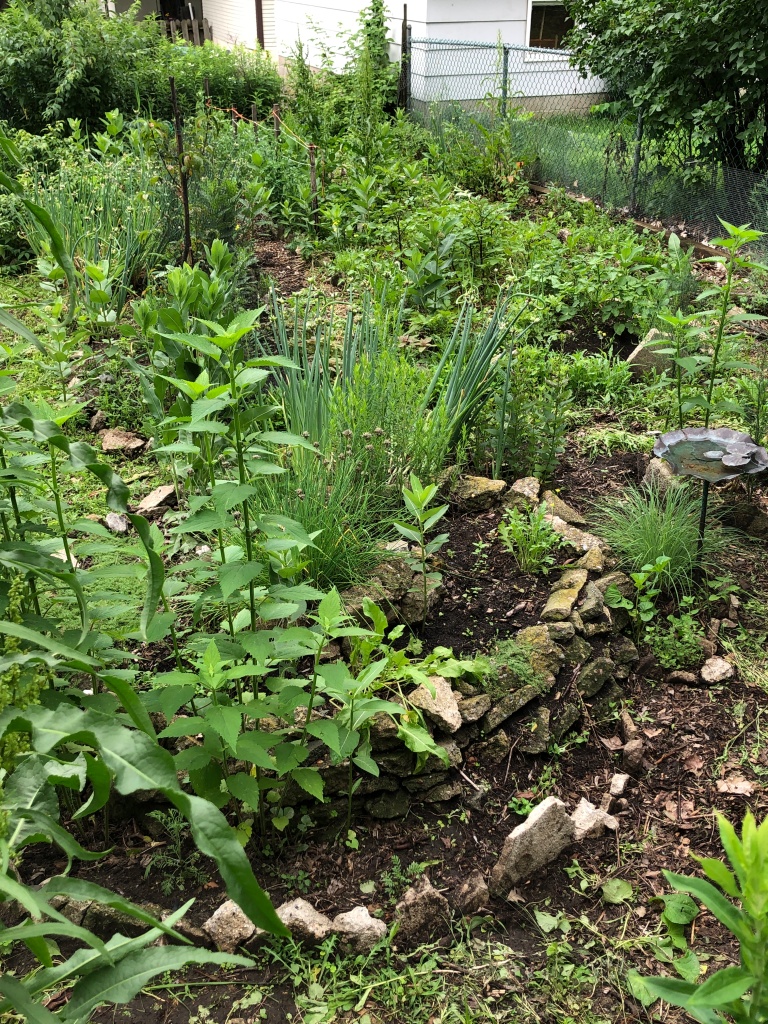
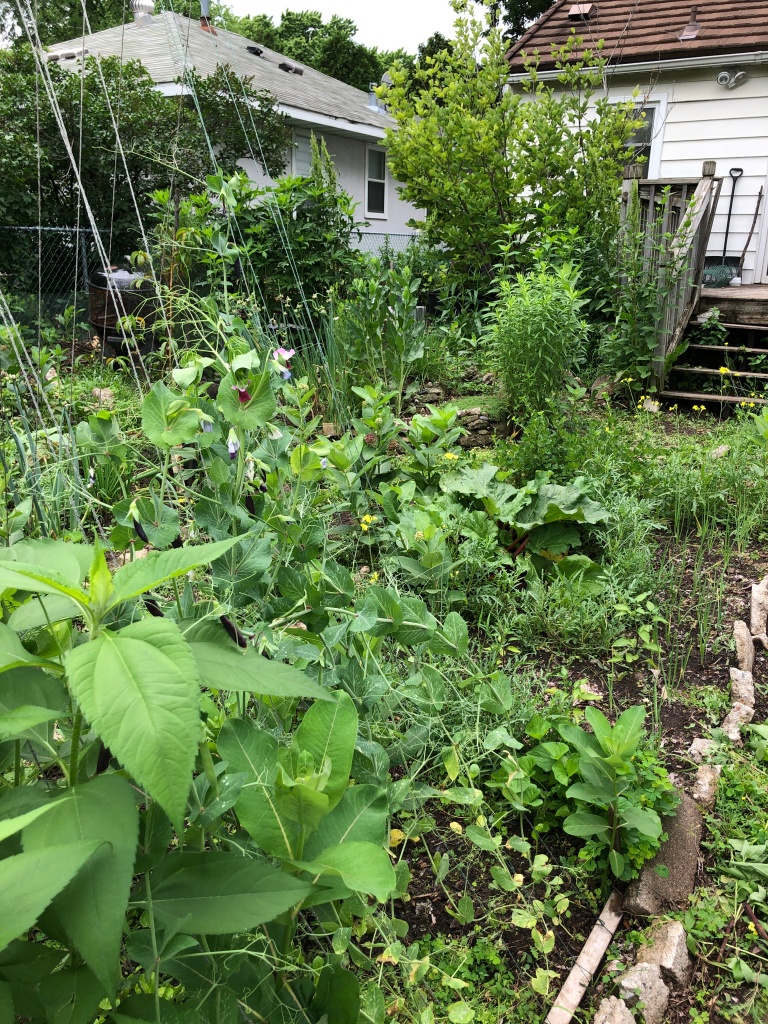
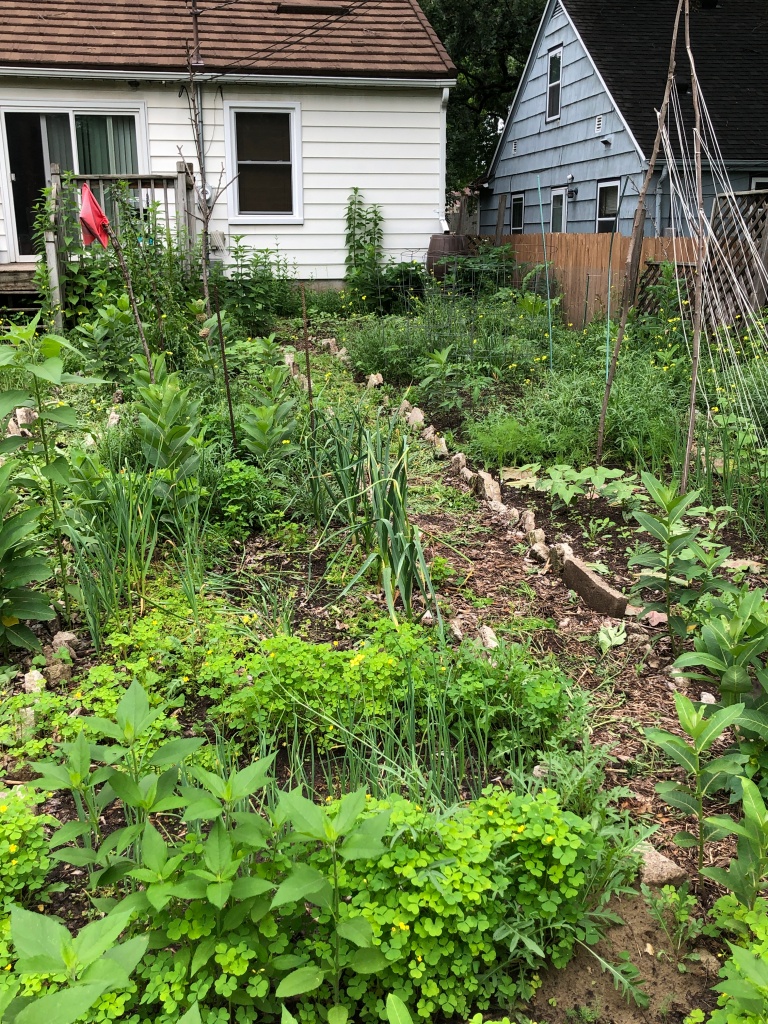
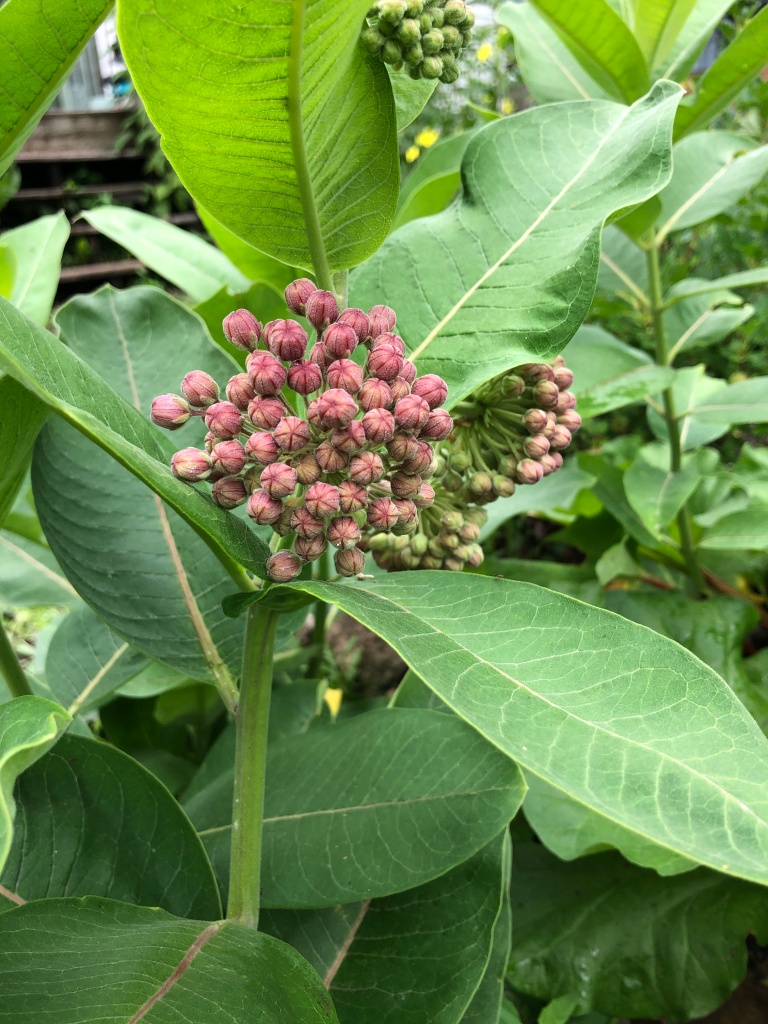
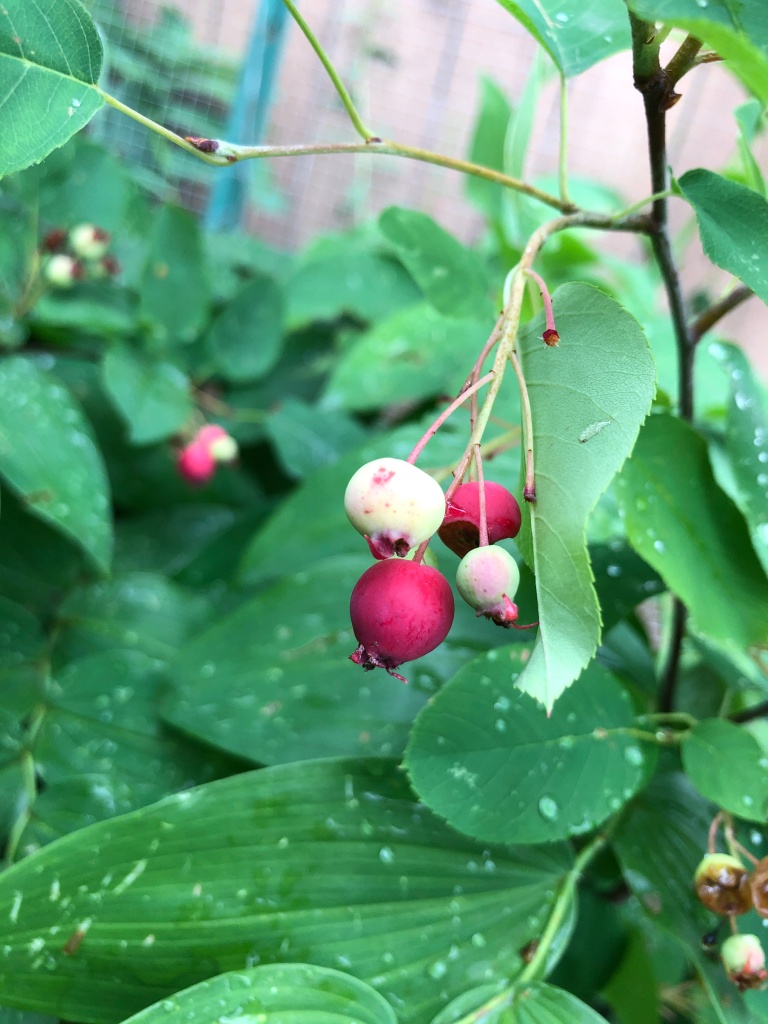
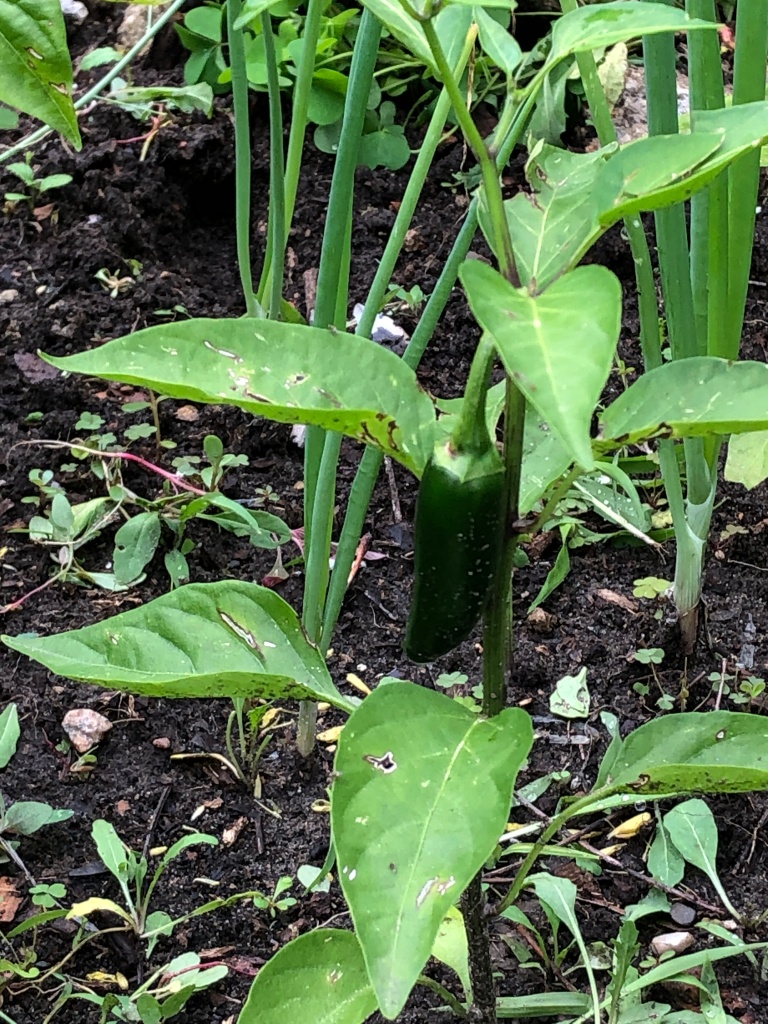
Oh, that documentary sounds wonderful. That point about love and hate is very thought-provoking, and I’d love to have been part of that discussion! I think we’re seeing the results of the mobilisation of hate on a large scale in a lot of world events right now, so clearly it’s very powerful.
On an individual level, though, I think it’s a lot harder to hate. Yeah, my sister and I used to have those arguments too, but I don’t think we really meant it 🙂 In my life right now, there are people I dislike or prefer to avoid, but I can’t think of anyone I hate, whereas there are plenty of people I love. I think it’s because you see the person’s humanity, so even if they’ve said or done something bad, you understand where it came from. That’s what’s missing in those large-scale hate-fests where whole groups of people are demonised. Maybe, also, I’ve just been lucky in my life so far, so I don’t have much cause to hate.
In any case, love can be more powerful than hate, I think, but it’s not so easy to mobilise on a large scale. Perhaps literature is a good way to start the work of dissolving hate by showing people’s individuality and humanity, evoking empathy and compassion, breaking down the simple categories that can be so harmful and replacing them with something more nuanced. Good books can make it hard to hate the people featured in them. Maybe it’s part of the work of scaling up Eco’s narrow, specific love into something more general and widespread.
I don’t know, I guess I’ll have to watch the documentary now!
LikeLiked by 1 person
Oh Andrew, the man has a rare book room with something like 1200 rare books in it! His house is a labyrinth of bookcases. Eco’s comment about hate and love are only a tiny blip in the documentary, but clearly they stuck with us.
I think you’re right that it is harder to hate on an individual level because you know the person. But I think it is also easy to make that person an exception and still hate the “group” they “belong” to.
I wonder why love is so much harder to mobilize on a large scale? Culturally we make fun of it. I’m thinking of how we make fun of the peace and love hippies from the 60s and if anyone these days gives a whiff of “being like that” they get made fun of too. It’s love is embarrassing or something. Or rather certain kinds of love, since we hold up romantic love as an ideal.
Good books can help, for sure. There are studies that show people are more empathetic towards people and groups after reading a story. But it’s no guarantee.
I hope you get the chance to see the documentary. If you do, please be sure to report what you think of it!
LikeLike
Yes, good point about making exceptions and liking the individual but not the group—that happens a lot. I think individual contact still has some value, though—there have been studies in the UK, for example, finding that the highest levels of anti-immigrant sentiment are often in the places with the smallest numbers of actual immigrants. Regular contact in more multi-cultural cities tends to make it harder to believe in the demonisation—although not for everyone, certainly.
Yeah, “peace and love” has become a kind of byword for hippie naivety, which is sad. Perhaps because a lot of the idealism of that era didn’t pan out, or perhaps because the idea of a broader, more all-encompassing, generalised love is so threatening to those who hold onto power by keeping us divided.
Not sure, but I’m grateful to you and James (and I guess also that Eco guy) for the thought-provoking prompt!
LikeLike
The photo of the birdbath makes that part of the garden look restful. From your description, though, I know there’s lots of activity! The squirrel shenanigans sound frustrating, but also like it’s a game you can win some points at, the points being counted in bites of zucchini.
When my kids were little, they would sometimes say “I hate…” and name a food, mostly because they heard their friends saying things like that about foods. Our response was always the same. We’d say in this family we don’t hate foods. We hate EVIL. (We said EVIL in a particular way that requires capitals.)
LikeLiked by 1 person
Thanks Jeanne! I rescued that area from weeds and some overgrown perennials and it is peaceful until a squirrel comes romping through or a sparrow bombs in 😀
Heh, the squirrels and the zucchini are like a game and I feel like I’ve been very slow are figuring out the rules! As of yesterday there are two sprouts from the seeds planted at the same time as the eaten ones and so far, they have not been bothered even though they are not protected. I think the wire cages over the newly planted seeds have provided a distraction. Maybe.
That’s really cool regarding hate and foods! I suspect it helped your kids be m ore open to trying different things. And if you’re going to hate something, EVIL is a valid target 🙂
LikeLike